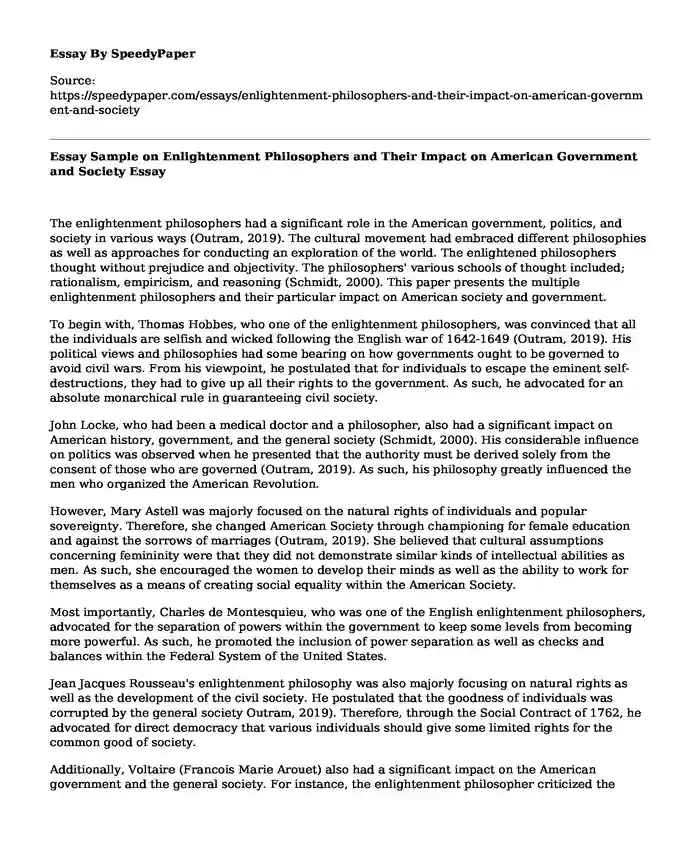
| Type of paper: | Essay |
| Categories: | Culture United States Philosophy |
| Pages: | 3 |
| Wordcount: | 618 words |
The enlightenment philosophers had a significant role in the American government, politics, and society in various ways (Outram, 2019). The cultural movement had embraced different philosophies as well as approaches for conducting an exploration of the world. The enlightened philosophers thought without prejudice and objectivity. The philosophers' various schools of thought included; rationalism, empiricism, and reasoning (Schmidt, 2000). This paper presents the multiple enlightenment philosophers and their particular impact on American society and government.
To begin with, Thomas Hobbes, who one of the enlightenment philosophers, was convinced that all the individuals are selfish and wicked following the English war of 1642-1649 (Outram, 2019). His political views and philosophies had some bearing on how governments ought to be governed to avoid civil wars. From his viewpoint, he postulated that for individuals to escape the eminent self-destructions, they had to give up all their rights to the government. As such, he advocated for an absolute monarchical rule in guaranteeing civil society.
John Locke, who had been a medical doctor and a philosopher, also had a significant impact on American history, government, and the general society (Schmidt, 2000). His considerable influence on politics was observed when he presented that the authority must be derived solely from the consent of those who are governed (Outram, 2019). As such, his philosophy greatly influenced the men who organized the American Revolution.
However, Mary Astell was majorly focused on the natural rights of individuals and popular sovereignty. Therefore, she changed American Society through championing for female education and against the sorrows of marriages (Outram, 2019). She believed that cultural assumptions concerning femininity were that they did not demonstrate similar kinds of intellectual abilities as men. As such, she encouraged the women to develop their minds as well as the ability to work for themselves as a means of creating social equality within the American Society.
Most importantly, Charles de Montesquieu, who was one of the English enlightenment philosophers, advocated for the separation of powers within the government to keep some levels from becoming more powerful. As such, he promoted the inclusion of power separation as well as checks and balances within the Federal System of the United States.
Jean Jacques Rousseau's enlightenment philosophy was also majorly focusing on natural rights as well as the development of the civil society. He postulated that the goodness of individuals was corrupted by the general society Outram, 2019). Therefore, through the Social Contract of 1762, he advocated for direct democracy that various individuals should give some limited rights for the common good of society.
Additionally, Voltaire (Francois Marie Arouet) also had a significant impact on the American government and the general society. For instance, the enlightenment philosopher criticized the French government to a point where he had to be imprisoned. He also advocated for freedom of religious toleration and speech, which were reflected in the Dictionnaire Philosophique (Schmidt, 2000). The ideas presented in the document by Jean formed the basis for the 1st Amendment to the Constitution of the United States.
Cesare Bonesana Beccaria, on the other hand, postulated that the various punishments that are meted on the offenders must fit the crimes committed. The fair criminal justice presented in his Crimes and Punishment (1764) formed the foundation for the 5th, 6th and 8th Amendments to the United States Constitution. Finally, Mary Wollstonecraft argued for political and social equity for all women. As such, he encouraged women not only to engage in 'womanly' professions but rather to have active involvement in politics, which changed the social discrimination against women in the United States.
References
Outram, D. (2019). The enlightenment (Vol. 58). Cambridge University Press.
Schmidt, L. E. (2000). Hearing things: Religion, illusion, and the American enlightenment. Harvard University Press.
Cite this page
Essay Sample on Enlightenment Philosophers and Their Impact on American Government and Society. (2023, Aug 27). Retrieved from https://speedypaper.com/essays/enlightenment-philosophers-and-their-impact-on-american-government-and-society
Request Removal
If you are the original author of this essay and no longer wish to have it published on the SpeedyPaper website, please click below to request its removal:
- The World Needs Culture Education - Free Essay on SpeedyPaper
- Free Essay: Facts and Issues Involved in Muller V Oregon
- Essay Sample on U.S. System vs. Other Developed Countries
- Essay Sample on Summary of the Main Ideas Presented in the Video
- The Impact on Uninsured Patients in Emergency Departments - Essay Example
- US Military Talent Management: Systematic Investment for Optimal Performance - Essay Sample
- Social Structures Unveiled: Essays on Wealth, Class, and Mobility in the United States - Report Sample
Popular categories




